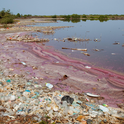Some of those who don't like the message of Kyoto appear to be directing their arrows against the perceived messenger: the intergovernmental panel on climate change (IPCC). The strategy adopted by Dick Taverne and Nigel Lawson in recent issues of Prospect aims to undermine the policy of Kyoto by discrediting the IPCC science behind it. But the IPCC simply summarises current scientific knowledge about climate change; it specifically does not recommend policy.
It is simply wrong to suggest that the IPCC is responsible for the Kyoto protocol. Lawson says, "The IPCC story [is about]… increases in world temperature… the only solution is to cut back on carbon dioxide emissions as much and as soon as possible, and the best way to do this is by the Kyoto process of internationally agreed emissions targets." This is not correct. Every scientist in the IPCC is continually reminded that his or her task is to summarise knowledge without drawing policy-prescriptive conclusions. Kyoto is in fact part of the UN framework convention on climate change (UNFCCC), which governments set up as a response to what the scientists were telling them. It is crucial for the IPCC to avoid making policy; only by maintaining and flaunting its neutrality can it continue to attract the best scientists.
Taverne and Lawson, and the recent House of Lords committee report on the IPCC and climate change, criticise "the IPCC's determination to suppress and ignore dissenting views." Taverne refers to two critics of the manner in which the IPCC uses exchange rates to calculate future GDP, and thus future emissions. In fact, the IPCC set aside several days of meetings to discuss these criticisms, and even paid the airfares of its critics to attend (from Australia to Europe in one case). There have been subsequent exchanges of published papers by different economists on the pros and cons of the different approaches. The literature on the differences will be reviewed in the next IPCC assessment, due in 2007.
A third contention is that the IPCC's assessments are unbalanced. "No mention is made of possible benefits of global warming," writes Taverne, "such as the positive effects on crops, the increased opportunities for tourism and the advantage of milder winters for northern Europe." In fact, acres of IPCC text are given over to weighing up the complicated pattern of positive and negative effects of warming; and the conclusion in 2001 was that there would be net positive impacts in many developed countries and net negative impacts in many developing countries, with the positive effects turning to negative as temperatures increased. Much of this differential effect is put down to the so-called "fertilisation" effect of CO2 on some important temperate crops, and the literature on this and the benefits of milder winters to temperate-latitude tourism and to the energy sector can be found reviewed in the IPCC third assessment. Were these IPCC reports actually read by those who criticised them?
Most strident is Nigel Lawson's conclusion that the IPCC is "so closed to reason, that it would be far better to… close it down, and transfer all future international collaboration on the issue of climate change to the established Bretton Woods institutions" (Lawson). But, once again, the IPCC's task is to assess what we know rather than to produce responses to that knowledge, like the IMF and World Bank. Moreover, far from being closed to reason, the IPCC is painstakingly balanced and comprehensive. Its lengthy cycles of write, review and revise are bounded by clear rules of procedure. The panel, comprising delegates nominated by governments from all UN and World Meteorological Organisation member states, decides upon the main issues for IPCC assessment. Then all governments and organisations are invited to nominate scientists as authors and reviewers of the assessment. The lead authors (about 470) are selected according to a set of criteria based on scientific knowledge and research record. All nominated scientists who are not selected as authors are invited to review the drafts, and others are specifically asked to be reviewers. There are over a thousand such reviews, and every comment is responded to by the authors, a process "policed" by separate review editors. Additionally, several hundred contributing authors provide component knowledge used by the lead authors. It is a lengthy—some would say cumbersome—process.
Few read all the 2,000 printed pages that result from this process, but if you dip into them you will find the authors constantly weighing up the balance of current knowledge and stating their uncertainties. I and others who have worked on the assessments have sometimes found their painstaking nature quite frustrating. They may not be perfect, but they are the best we can do and, above all, they are honest. It is truly curious that the Lords report seems to go out of its way to disparage them.
Most saddening is that a committee of parliament has missed an opportunity to conduct a proper appraisal of the issue. Why the rush to condemn the IPCC as politically biased on the basis of flimsy and flawed evidence? Why confuse the reader between IPCC and UNFCCC?











